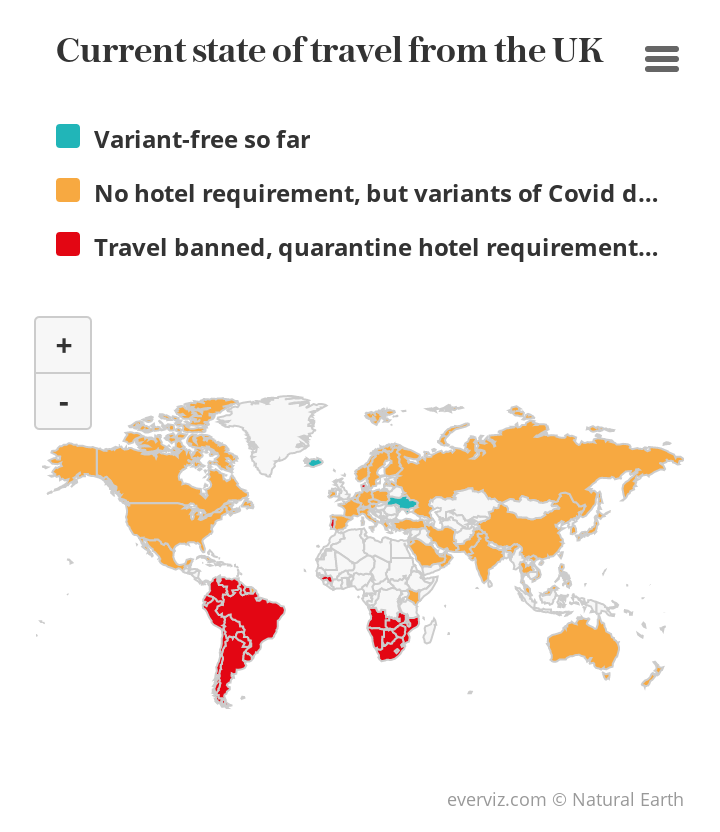British holidaymakers will be stopped at border and sent home, Priti Patel warns


People attempting to go on holiday will be stopped at the border and sent home, Priti Patel said as she hit out at social media influencers for boasting about beating travel bans.
The Home Secretary said anyone without a valid reason to leave the UK will be turned back and face fines of £200 as part of a travel crackdown to prevent the spread of new Covid strains that could undermine vaccines.
People will be expected to fill out a "declaration" form explaining why they need to travel before they leave home, which will then be checked by airlines, police and border force officers.
Ms Patel said that even in lockdown individuals had been flouting bans on non-essential travel, citing some turning up at St Pancras Eurostar terminal with their skis, a situation that was "clearly not acceptable".
"We see plenty of influencers on social media showing off about which parts of the world they are in, mainly in sunny parts of the world. Going on holiday is not an exemption and it's important that people stay at home," the Home Secretary told MPs.
Watch: A holiday is not a valid reason to travel
The Cabinet Office is to review all travel exemptions to permit them only for the "most important and exceptional reasons", she said as she also confirmed plans for Britons returning from 30 "red list" countries to be quarantined for 10 days in Government-approved hotels.
People will only be allowed to travel for essential work that cannot be done from home or for education, a medical emergency or a bereavement.
"Do you absolutely have to travel to New York for business or can it be done over Zoom?" said one Government official. "Or will that multi-million pound deal fall through if you are not there?"
Exemptions for hauliers vital to trade and for staff to maintain critical infrastructure, medical, military, diplomatic or scientific work are expected to continue. However, those for elite sportspeople such as footballers are being reconsidered.
"Removing the exemption altogether would be pretty devastating for sport and given their strictness of testing we haven't had to change it so far," said a source in favour of retaining their exemption. "We will be impressing on sports the fewer trips the better, and only where absolutely necessary."

Ms Patel said the aim was to "reduce passenger flow so that only a small number of people for whom it is absolutely essential to travel are doing so and therefore reducing the risk to our world-leading vaccine programme".
Some 15,000 people a day are currently entering the UK, with all being checked from this week by Border Force. Airlines must ensure passengers have negative Covid-19 tests within 72 hours of departure and that locator forms are filled in for quarantine. The Home Office refused to say how far it wanted the figure reduced.
Liability for outgoing checks to weed out non-essential travellers will rest with airlines, who will face potential £2,000 fines if they fail to do so. There will also be increased police at airports and ports who will conduct on-the-spot checks on people’s reasons for travel.
People who continue to arrive in the UK from countries outside the 30 "red list" nations will still be required to quarantine for up to 10 days unless they get a negative test result on the fifth to allow them to leave it.
But the number of follow-up daily calls on them by Public Health England will increase on Thursday from 1,500 to 5,000, while police spot checks at homes will rise to around 1,000 a day.
Foreign residents of the "red list" countries linked to new Covid variants are still banned from coming to the UK, but Britons can return from them. They will, however, have to quarantine for 10 days in the Government-approved hotels at a personal cost of up to £1,500 once back in the UK.
The list covers 30 countries in South America and southern Africa, Portugal and Cape Verde. Kenya, Ethiopia, the United Arab Emirates and Nigeria are likely to be added on Thursday.
There were fears on Wednesday night that there could be a surge in people booking flights to beat hotel quarantine and the new outgoing travel restrictions, which are not expected to take effect for days, if not weeks.
The Government is also facing a backlash from the devolved Scottish and Welsh administrations and Labour who want to extend quarantine hotels to all arrivals and not just those from the "red list".
Watch: What UK government COVID-19 support is available?

 Yahoo News
Yahoo News 